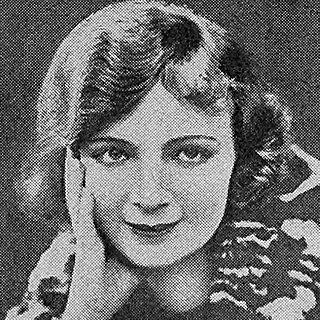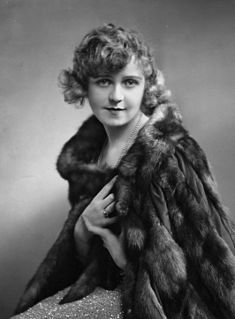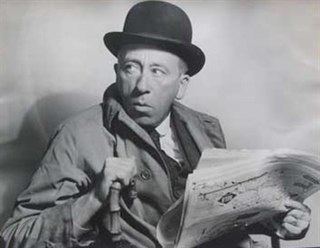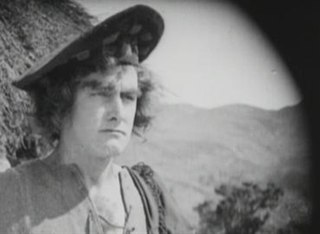Related Research Articles

Sir Michael Elias Balcon was an English film producer known for his leadership of Ealing Studios in West London from 1938 to 1955. Under his direction, the studio became the one of the most important British film studios of the day. In an industry short of Hollywood-style moguls, Balcon emerged as a key figure, and an obdurately British one too, in his benevolent, somewhat headmasterly approach to the running of a creative organization. He is known for his leadership, as well as guidance of young Alfred Hitchcock.

Mabel Lilian Poulton was an English film actress, popular in Britain during the era of silent films.
George Pearson OBE, was a pioneering English film director, producer and screenwriter, mainly in the silent film era. He was born in London.

Ernest Frederic Graham Thesiger, CBE was an English stage and film actor. He is noted for his performance as Doctor Septimus Pretorius in James Whale's film, Bride of Frankenstein (1935).

Betty Balfour was an English screen actress, popular during the silent era, and known as the "British Mary Pickford" and "Britain's Queen of Happiness". She was best known to audiences for her Squibs series of films.

Hugh E. Wright was a French-born, British actor and screenwriter. He was the father of actor Tony Wright.

Milton Subotsky was an American film and television writer and producer. In 1964, he founded Amicus Productions with Max J. Rosenberg. Amicus means "friendship" in Latin. Together, they produced a number of low-budget science fiction and horror films in the United Kingdom.

Eliot Stannard was an English screenwriter and director. He was the son of civil engineer Arthur Stannard and Yorkshire-born novelist Henrietta Eliza Vaughan Palmer. Stannard wrote the screenplay for 88 films between 1914 and 1933, including eight films directed by Alfred Hitchcock. He also directed five films. During the early 1920s, he worked on most of the screenplays for the Ideal Film Company, one of Britain's leading silent film studios.

William Gordon Harker was an English stage and film actor.

Squibs is a 1935 British musical romantic comedy film directed by Henry Edwards and starring Betty Balfour, Gordon Harker and Stanley Holloway.
Squibs is a 1921 British silent comedy film directed by George Pearson and starring Betty Balfour, Hugh E. Wright and Fred Groves. It was followed by three sequels starting with Squibs Wins the Calcutta Sweep and a 1935 remake.
Squibs Wins the Calcutta Sweep is a 1922 British silent comedy film directed by George Pearson and starring Betty Balfour, Fred Groves and Hugh E. Wright. It was the sequel to the 1921 film Squibs.

David Hawthorne was a British stage and film actor. He played the leading man in a number of films during the silent era, but later switched to character roles. One of his more notable roles was that of Rob Roy MacGregor in the 1922 film Rob Roy.

A Little Bit of Fluff is a British farce written by Walter W. Ellis which was first staged in 1915 and went on to have a long original run. Starring Ernest Thesiger, it ran at the Criterion Theatre, London, between 1915-1918, for a total of 1241 performances.
Thomas Welsh was a British film producer. Along with George Pearson he was one of the co-owners of Welsh-Pearson, a leading British company of the late silent era. The company made many popular hits at its Craven Park Studios during the 1920s.
Mary Find the Gold is a 1921 British silent drama film directed by George Pearson and starring Betty Balfour, Tom Coventry and Hugh E. Wright.

Blinkeyes is a 1926 British silent drama film directed by George Pearson and starring Betty Balfour, Tom Douglas, and Frank Stanmore.
Wee MacGregor's Sweetheart is a 1922 British silent romance film directed by George Pearson and starring Betty Balfour, Donald Macardle and Nora Swinburne.
Squibs M.P. is a 1923 British silent comedy film directed by George Pearson and starring Betty Balfour, Hugh E. Wright and Fred Groves.
Squibs' Honeymoon is a 1923 British silent comedy film directed by George Pearson and starring Betty Balfour, Hugh E. Wright and Fred Groves. It was the last of the silent film series featuring the character, although Balfour returned to play her in the 1935 sound film Squibs. Both Pearson and Balfour were particular favourites of the British film critic, and later leading screenwriter, Roger Burford. In his first article for the magazine Close Up Burford would write "Not long ago a film of the Squibbs series was reported to be on at a small cinema in a slum district. It was a rare chance, and we went at once. We were not disappointed: the film was English, with proper tang; the tang of Fielding or Sterne.' Burford's comments help place the Squibbs films perfectly in British culture between the wars. They were very much working-class comedy, drawing on a vernacular, performative tradition, but at the same time their "Englishness" is characteristic of the kinds of satirical comedies found in the novels of Henry Fielding and Laurence Sterne. That earthy satire, based on everyday life, made these comedies unpalatable to middle class audiences but the Squibbs films were amongst the most interesting, and well shot, films in Britain in the 1920s.
References
- ↑ "BFI Screenonline: Pearson, George (1875-1973) Biography". www.screenonline.org.uk.
- ↑ Warren p. 21
- ↑ "BFI Screenonline: Balfour, Betty (1903-1978) Biography". www.screenonline.org.uk.
- ↑ "Squibs (1921) - George Pearson - Synopsis, Characteristics, Moods, Themes and Related - AllMovie". AllMovie.
- ↑ "James Whale - Biography, Movie Highlights and Photos - AllMovie". AllMovie.
- ↑ Brown, Mark (2 April 2014). "Lost British silent film classic Love, Life and Laughter found in Dutch archive". The Guardian.
- ↑ "George Pearson - Culham College". www.culhamcollege.co.uk.
